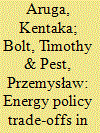| Srl | Item |
| 1 |
ID:
179735


|
|
|
|
|
| Summary/Abstract |
This study applied a discrete choice experiment using best-worst scaling questions (multi-profile, BWS case 3) to estimate the trade-offs which a sample of the Polish population is willing to make for energy reform regarding carbon reduction. Attributes considered in the study are CO2 emissions reduction, National energy independence, Employment impact, Time needed for policy transition, and Impact on household energy prices. Respondents (n = 639) choose the best and worst of the presented policy options to fit a rank-ordered logit model. This study reveals concern about climate change among respondents, but that they prioritize energy prices and employment in their choice of preferred energy policy with significant variation across groups. A key distinction is revealed in the preferences by age cohort in which youngest (<25years old) respondents had the strongest WTP coefficients, particularly for CO2 and time to transition. Stronger and more urgent desires for CO2 reduction policies were also identified among the decisions of female respondents, those having more education, those without children, and middle and upper income groups. The respondents’ choices also revealed consistent loss aversion in all attributes presented in the choice experiment.
|
|
|
|
|
|
|
|
|
|
|
|
|
|
|
|
| 2 |
ID:
125805


|
|
|
|
|
| Publication |
2013.
|
| Summary/Abstract |
We investigated whether the increase in the US shale gas production changed the structures of the US and Japanese natural gas markets using market data for the period 2002:5-2012:5. Our analysis consists of a structural break test and market integration analysis. The Bai and Perron structural break test detected a break point of natural gas prices and consumption in 2005 as well as other external shocks - Hurricane Katrina and the Lehman Shock - that are irrelevant to shale gas development. We eliminated the impact of these shocks by separating the data set using the breaks identified in our analysis. We found the breaks skewed the estimation; a market linkage existed between the US and Japanese markets in the original data set, while it did not in the separated data. The vector autoregressive (VAR) model also indicated a significant change before and after the break point; the US market had a one-side influence on the Japanese market before 2005, but the influence disappeared after 2005. Our results implied that the shale gas revolution, triggered by the increase in shale gas production in 2005, caused the change in the relationship between the US and Japanese natural gas markets.
|
|
|
|
|
|
|
|
|
|
|
|
|
|
|
|